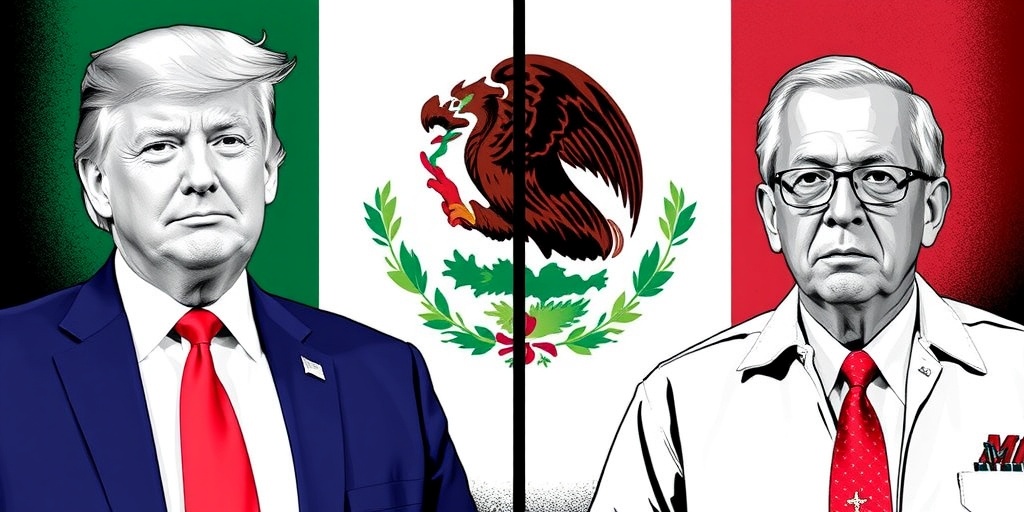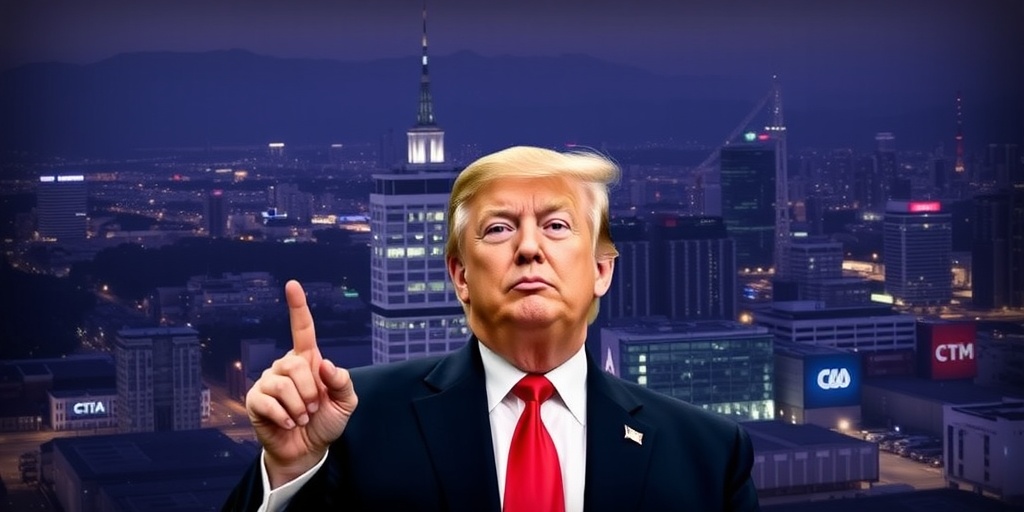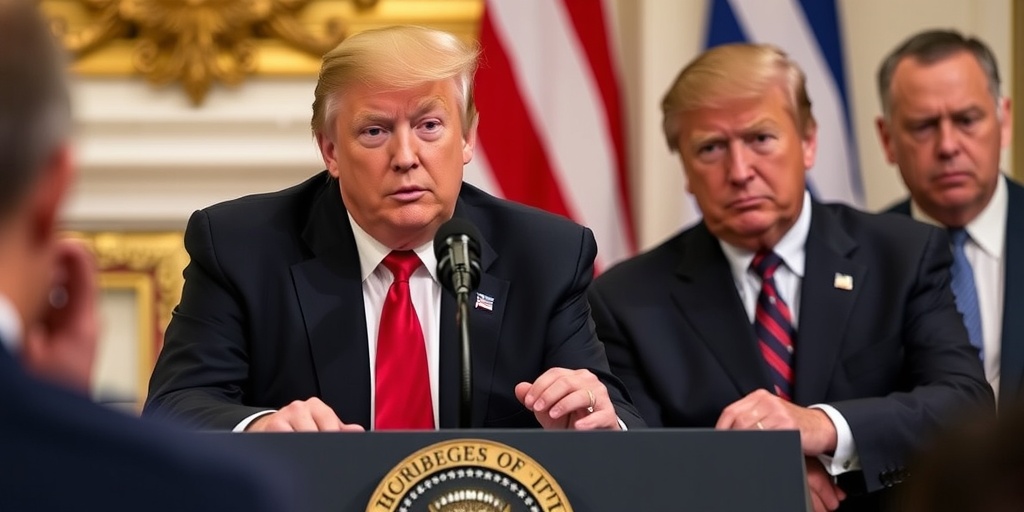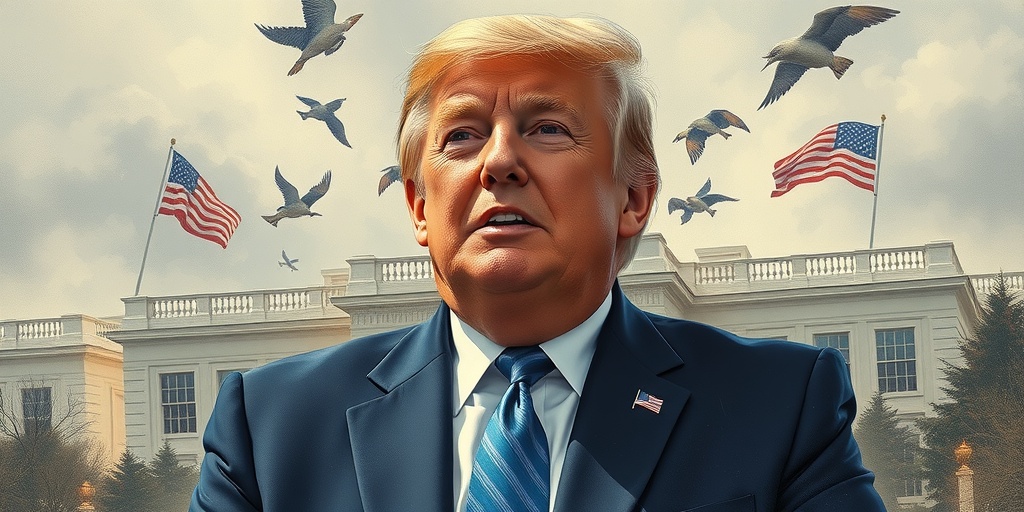Now Reading: Trump Officials Divided on Approach to Mexican Cartels
-
01
Trump Officials Divided on Approach to Mexican Cartels
Trump Officials Divided on Approach to Mexican Cartels

U.S.-Mexico Relations Strained Over Military Action Against Drug Cartels
Inside the Trump administration, a contentious debate has emerged regarding the most effective strategy to address the ongoing crisis posed by drug cartels in Mexico. One side advocates for unilateral military strikes against cartel leaders and operations to mitigate the rampant flow of narcotics entering the United States, while the opposing faction emphasizes the importance of collaboration with Mexican authorities to dismantle these criminal enterprises collectively.
Reports indicate a schism within the ranks of U.S. officials. Some are calling for a more aggressive approach that entails using American military resources against cartel figures and their infrastructure, believing that such action could disrupt drug trafficking routes. Conversely, others are urging a more measured tactic that involves enhancing partnerships with the Mexican government, hoping to maintain collaboration on migration issues as well.
This internal debate is set against the backdrop of an anticipated high-level meeting in Washington this Thursday, where a Mexican delegation is expected to discuss a newly drafted security agreement with senior U.S. officials. This agreement, reportedly designed to foster cooperation, comes amid vague ultimatums issued by American officials, suggesting that Mexico must take decisive action against cartels or risk facing the full brunt of U.S. power. Such ambiguous threats have led to confusion among Mexican authorities as they navigate their own response.
The confusion is exacerbated by the recent designation of several influential Mexican cartels as foreign terrorist organizations by the State Department. This classification heightens the stakes for Mexico, as it could facilitate the deployment of U.S. military and intelligence resources against these groups, should the Biden administration choose to pursue that course of action.
At the forefront of the push for military intervention is Sebastian Gorka, a prominent figure in the White House National Security Council’s counterterrorism division. Gorka, known for his strong defense of President Trump’s policies, is reportedly collaborating with a former officer of the Joint Special Operations Command to develop plans for military operations aimed at dismantling powerful cartels in Mexico. This aggressive strategy, however, is met with skepticism by others in the administration.
Stephen Miller, head of the White House’s Homeland Security Council, stands as a voice of caution, stressing the need for a cooperative approach that respects Mexico’s sovereignty. Miller, who has extensive experience with federal law enforcement in operations against drug traffickers, is concerned that a hardline stance could jeopardize ongoing cooperation in efforts to control migration—an issue central to Trump’s policy agenda.
The impending discussions may bring more clarity to U.S.-Mexico relations, particularly as Mexican Secretary of Security Omar García Harfuch and his team engage with American counterparts. Just days before this meeting, Trump announced plans to impose a significant 25 percent tariff on Mexican imports as retribution for perceived inaction against the flow of fentanyl into the U.S.
The draft security framework that will be discussed aims to enhance cooperation between U.S. and Mexican law enforcement agencies, advocating for the arrest of cartel leaders and the formation of specialized Mexican units vetted by American law enforcement. This framework also seeks to address broader issues surrounding migration and border security.
President Claudia Sheinbaum of Mexico has firmly rejected the notion of unilateral U.S. military actions, insisting that any interventions be undertaken in cooperation with Mexican forces. She emphasized the importance of sovereignty, stating that her government seeks coordination rather than subordination from the United States. In light of the tensions, her administration has expressed a commitment to amending laws to restrict the activities of foreign agents operating in Mexico independently.
To assist the Mexican government, the CIA has reportedly intensified its use of drone flights over the country, although these operations are limited to intelligence sharing and do not permit lethal actions without authorization. Meanwhile, the U.S. military’s Northern Command is increasing surveillance at the border without entering Mexican airspace.
Tensions are exacerbated by a series of incidents in which Mexican officials perceived direct American intervention as undermining their sovereignty. Last summer, the kidnapping of a notorious drug lord, Ismael Zambada García, generated outrage in Mexico, leading to demands for accountability from U.S. authorities.
In light of heightened military rhetoric from the U.S., Mexico has intensified its own anti-cartel efforts, achieving significant drug seizures and high-profile arrests aimed at demonstrating its commitment to combating organized crime. In December 2024, Mexican authorities reported the confiscation of over 20 million doses of fentanyl, marking one of their largest narcotics busts to date.
The intricate dynamics between the two countries suggest that any missteps or aggressive actions could unravel decades of cooperation. Analysts have warned that the current tensions, if not carefully managed, could threaten the collaborative efforts required to effectively combat drug trafficking and organized crime in the region. Both nations face the critical task of navigating these challenges while preserving their diplomatic relations in the tumultuous arena of drug enforcement.
Stay Informed With the Latest & Most Important News
Previous Post
Next Post
-
 01New technology breakthrough has everyone talking right now
01New technology breakthrough has everyone talking right now -
 02Unbelievable life hack everyone needs to try today
02Unbelievable life hack everyone needs to try today -
 03Fascinating discovery found buried deep beneath the ocean
03Fascinating discovery found buried deep beneath the ocean -
 04Man invents genius device that solves everyday problems
04Man invents genius device that solves everyday problems -
 05Shocking discovery that changes what we know forever
05Shocking discovery that changes what we know forever -
 06Internet goes wild over celebrity’s unexpected fashion choice
06Internet goes wild over celebrity’s unexpected fashion choice -
 07Rare animal sighting stuns scientists and wildlife lovers
07Rare animal sighting stuns scientists and wildlife lovers





















